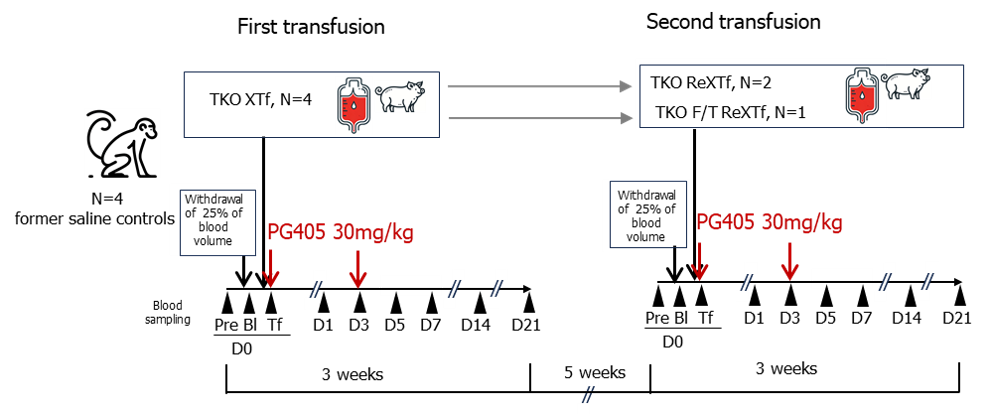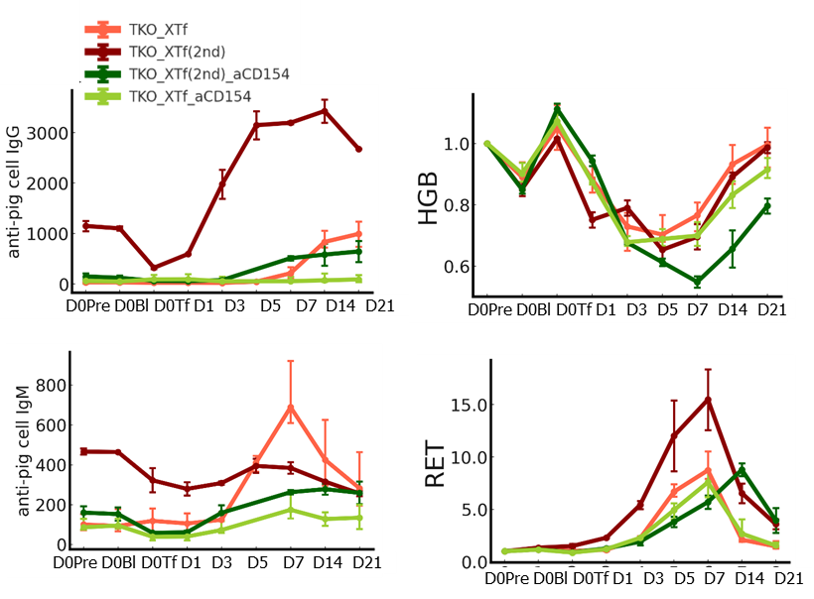Improving pig red blood cell transfusion safety with anti-CD154 co-administration in nonhuman primates
Hee Jung Kang1, Juhye Roh1, Eun Mi Park1, Haneulnari Lee1, Hye Won Lee1, Ju Young Lee2, Jeong Ho Hwang2, Joohyun Shim3, Hyunil Kim3.
1Laboratory Medicine, Hallym University College of Medicine, Anyang, Korea; 2Animal Model Research Group, Korea Institute of Toxicology, Jeongeup, Korea; 3Transgenic Animal Research, Optipharm Inc., Cheongju, Korea
Background: Declining blood donation rates and a narrow supply-demand margin pose challenges in transfusion medicine. Genetically engineered pig red blood cells (pRBCs) are a potential alternative to human RBCs. In nonhuman primates (NHPs), pRBC transfusions provide short-term hematological benefit without severe adverse reactions but induce anti-pRBC antibody formation, increasing risks upon repeated transfusions. Anti-CD154 antibodies block the CD40-CD154 co-stimulation pathway and suppress B cell activation. This study investigated whether co-administering anti-CD154 with pRBCs could reduce antibody induction and transfusion-related risks in NHPs.
Methods: Triple knockout (TKO) pigs (Optipharm, Korea) provided RBCs for transfusion. After 25% blood volume withdrawal, NHPs received TKO pRBCs with PG-405 (anti-CD154(Fab)-NTIG-IL-10, ProGen; 30 mg/kg IV), repeated 3 days later (TKO XTf_aCD154, N=4). Eight weeks later, 2 of these NHPs underwent repeat transfusion with the same anti-CD154 protocol (ReXTf_aCD154, N=2). Blood samples were collected at multiple time points to assess hematologic, biochemical, cytokine, complement, and anti-pRBC antibody profiles. Data were compared with prior cohorts without anti-CD154: TKO XTf (N=8) and ReXTf (N=2).
Results: Anti-CD154 did not affect lymphocyte subsets or general blood and cytokine profiles. However, anti-pig antibody induction was significantly reduced in TKO XTf_aCD154 compared to TKO XTf. On day 21, agglutination titers were lower in TKO XTf_aCD154 (median 2 vs. 128, P=0.0057). In repeat transfusions, ReXTf_aCD154 showed lower pre-transfusion titers (median 5.6 vs. 45) and preserved the hematologic benefit up to 24 hours without signs of adverse reactions, unlike ReXTf.
Conclusions: Anti-pRBC antibody induction remains a barrier to clinical xenotransfusion. Co-administration of anti-CD154 significantly suppressed antibody responses and mitigated adverse effects during repeated transfusions. pRBCs combined with anti-CD154 may offer a feasible alternative to human RBCs for transfusion. (Grant No. 22-CM-EC-18)


[1] Xenotransfusion
[2] Anti-CD154
[3] Nonhuman primate
[4] Anti-pig antibodies
[5] Transfusion reaction